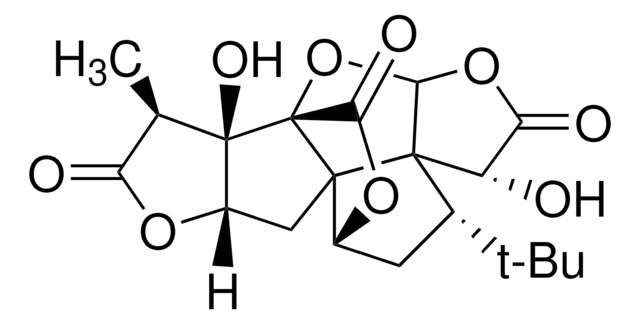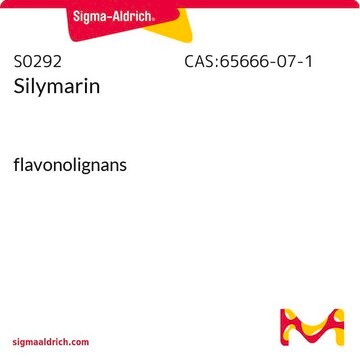G6910
Ginkgolide B from Ginkgo biloba leaves
≥90% (HPLC)
Synonym(s):
BN-52021
About This Item
Recommended Products
Quality Level
Assay
≥90% (HPLC)
technique(s)
HPLC: suitable
gas chromatography (GC): suitable
application(s)
food and beverages
format
neat
storage temp.
−20°C
SMILES string
C[C@@H]1C(=O)O[C@H]2[C@H](O)[C@@]34[C@H]5C[C@@H](C(C)(C)C)[C@@]36[C@@H](O)C(=O)O[C@H]6O[C@@]4(C(=O)O5)[C@@]12O
InChI
1S/C20H24O10/c1-6-12(23)28-11-9(21)18-8-5-7(16(2,3)4)17(18)10(22)13(24)29-15(17)30-20(18,14(25)27-8)19(6,11)26/h6-11,15,21-22,26H,5H2,1-4H3/t6-,7+,8-,9+,10+,11+,15+,17+,18+,19-,20-/m1/s1
InChI key
SQOJOAFXDQDRGF-MMQTXUMRSA-N
Looking for similar products? Visit Product Comparison Guide
General description
Application
- For the chromatographic separation of the analyte in Ginkgo biloba leaves extract and to study the antimicrobial activity exerted on a variety of Gram-positive and -negative bacteria and yeasts.
- For the determination of the analyte in Ginkgo biloba L. phytopharmaceuticals using high-performance liquid chromatography technique.
Biochem/physiol Actions
Signal Word
Warning
Hazard Statements
Precautionary Statements
Hazard Classifications
Eye Irrit. 2 - Skin Irrit. 2 - STOT SE 3
Target Organs
Respiratory system
Storage Class Code
11 - Combustible Solids
WGK
WGK 3
Flash Point(F)
Not applicable
Flash Point(C)
Not applicable
Personal Protective Equipment
Certificates of Analysis (COA)
Search for Certificates of Analysis (COA) by entering the products Lot/Batch Number. Lot and Batch Numbers can be found on a product’s label following the words ‘Lot’ or ‘Batch’.
Already Own This Product?
Find documentation for the products that you have recently purchased in the Document Library.
Our team of scientists has experience in all areas of research including Life Science, Material Science, Chemical Synthesis, Chromatography, Analytical and many others.
Contact Technical Service








